Michael recently left me a heartbreaking comment on one of my previous posts about Grazon contamination in manure:
“We have about 80 acres in pasture. Four years ago our co op started a spraying program. Having horses grazon was recommended. I was told it was safe for the horses to stay in the pasture while it was sprayed and even ok for the horses to eat while still wet. I was never told not to compost the manure. Two years ago I started composting manure out of the pasture, this year I started giving it to friends. What a ***** mess. I spent a lot of time with a shovel collecting the manure, turning it, and delivering it to friends. I’ve had two contact me about their gardens and problems they’re having. One of them asked if we were using grazon. This is going to cost me a great deal of time and money to fix. Some are small raised gardens and I’m going to go in and remove and replace the soil. Some are larger, up to an acre, I don’t know what we’re going to do. I’m open to all suggestions. Thanks.”
Aminopyralids are bad news, yet a lot of people don’t know how bad they are yet. People need to recognize the problem.
Recognize Grazon is a Serious Problem
People are still disbelieving on this topic. Look at some of the comments on this video:
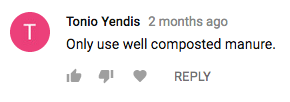






No, it’s NOT that the manure is too hot or not composted enough. Stop blaming the gardener. A lot of farmers and gardeners have been growing with manure for years and never had anything like this happen. I know what too much nitrogen looks like, as does pretty much every person I’ve met who has been hit with a Grazon kill in their beds.
It’s a serious, persistent, long-term herbicide that is taken up in plant material and can be consumed by animals, passed through in their manure, then still be toxic to gardens even after months or possibly years of composting.
It is evil. It is nasty. It is here and if you put manure on your gardens without knowing 100% that it’s not contaminated with this crap, you are running a very high risk of losing your plants.
What Does Grazon Contamination Look Like
If you think you have been hit with Grazon, look at the leaves. If they look weirdly twisted and curled and you’ve applied manure, straw or hay at some point, it’s probably Grazon.
Grazon damage looks like this:
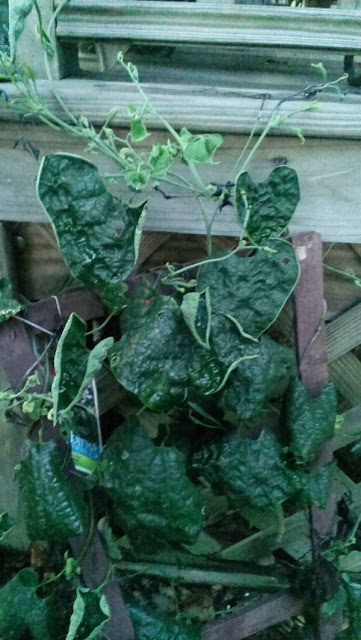
And it looks like this:
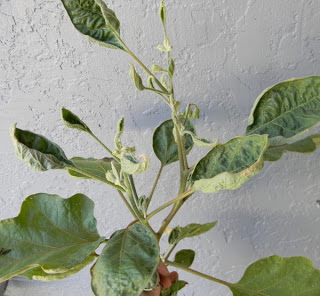
The plant is often still green and trying to grow, but it will never produce anything. All the new growth twists and thickens as the cell-stacking function is inhibited by the toxin, causing that weird, horrible growth, and tinier and tinier little leaves.
Read Karen Land’s story. It’s another heartbreaker, but you can see what happened when a really good gardener was hit by this stuff.
Fixing Grazon Contamination
So – what do you do once you know you’ve been hit?
First of all, remove all the manure you can. Get it out of your garden beds. Scrape it and throw it somewhere at the edge of your property or in an empty lot where it won’t hurt anything else.
Take out the plants that have already been effected and throw them away. Don’t compost them, because that will just add the toxin to your compost. Throw them out or check them where you chuck the manure.
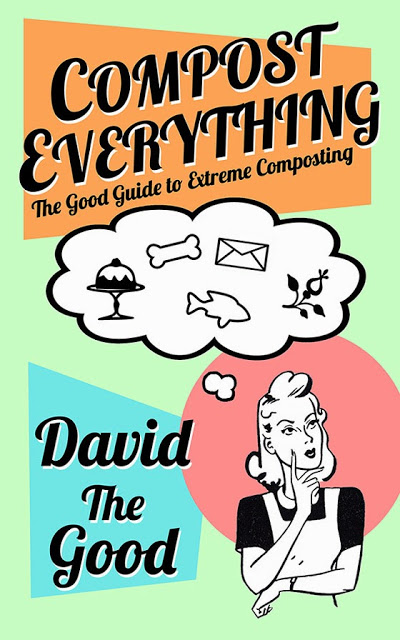 After doing all the clean up you can, try adding some crushed charcoal to the beds. Activated charcoal dust would be really good. And throw in compost – NOT aminopyralid-laced compost – when you do, knowing that the charcoal is going to suck a lot of the nutrition out of the soil along with the herbicide. A friend of mine had some of her tomatoes live through Grazon-contaminated manure thanks to the ashes and charcoal she had planted them in. The ones which got the manure without the charcoal were destroyed.
After doing all the clean up you can, try adding some crushed charcoal to the beds. Activated charcoal dust would be really good. And throw in compost – NOT aminopyralid-laced compost – when you do, knowing that the charcoal is going to suck a lot of the nutrition out of the soil along with the herbicide. A friend of mine had some of her tomatoes live through Grazon-contaminated manure thanks to the ashes and charcoal she had planted them in. The ones which got the manure without the charcoal were destroyed.
Another option is to plant members of the grass family for a couple of seasons. They are not affected by the toxin as it’s targeted at broad-leaf plants, not grasses. You can plant corn and grains and they’ll produce. Again, though, don’t compost the stalks.
The final thing I would say on this is: complain! Tell everyone about this garbage. It should be illegal, as it’s doing untold destruction to gardens and farms across the country. There is no responsible way to use this poison. It needs to be done away with. Vermont has already pulled the trigger. The rest of the nation should follow.
I have a lot more on Grazon and avoiding it in my book Compost Everything: The Good Guide to Extreme Composting. Don’t get hit!
Finally, if you aren’t sure if you have Grazon in your amendments or not, here’s an easy test you can perform:

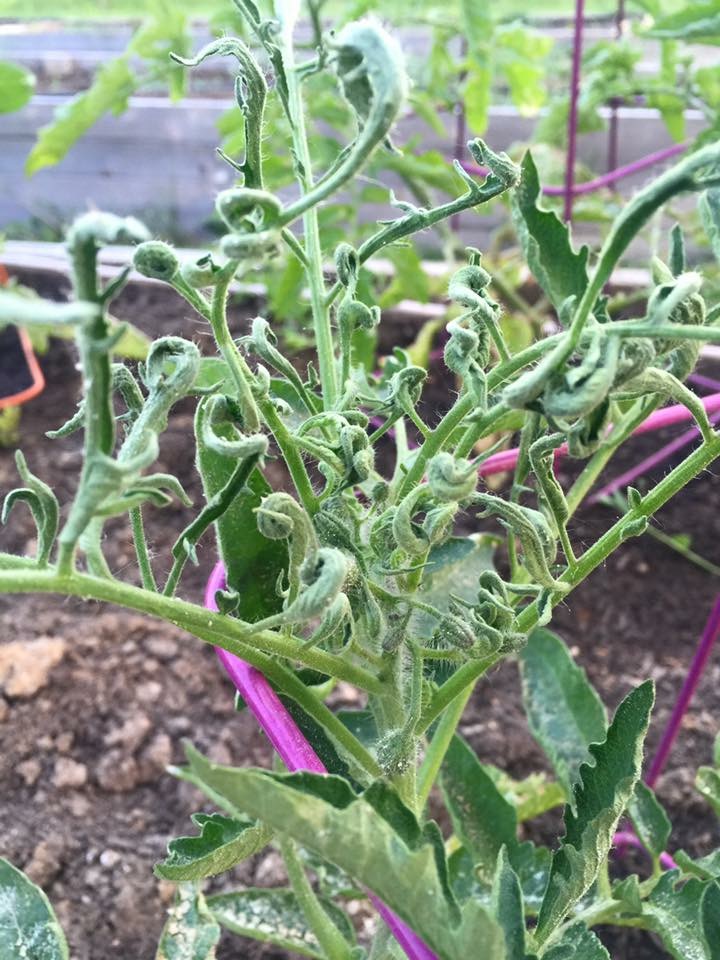
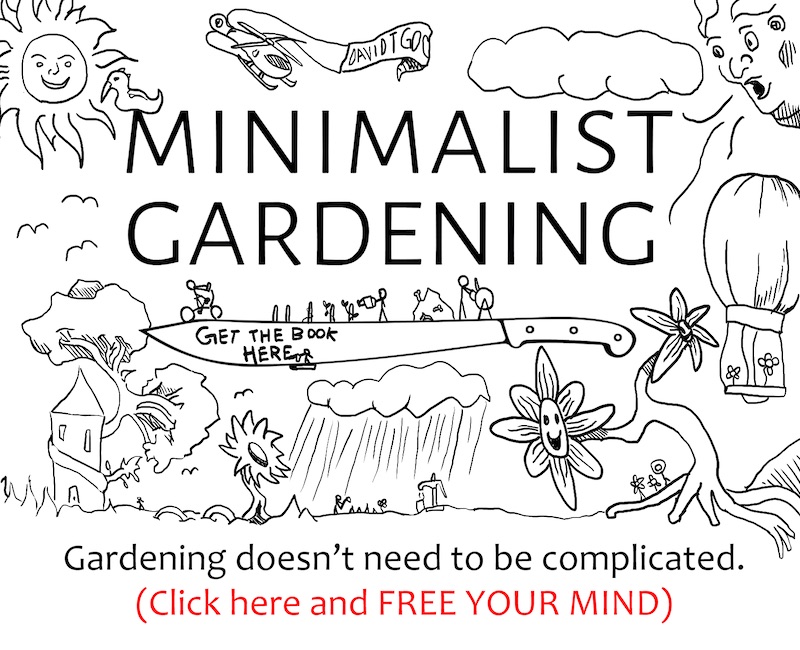
48 comments
Do we know if this stuff is toxic to people? My mother lost her last garden (a few years ago: she only has potted plants now) to aminopyralids, via a truckload of contaminated mushroom compost. Turns out mushroom compost is made from… cow manure. And cows eat grass and hay. And whoever grew the grass and hay was using… aminopyralids. That’s an awfully long chain of contamination. I don’t think you could even *begin* to trace the source. Which sort of begs the question: is *any* garden amendment safe to use without interviewing the entire supply chain first? Mushroom compost used to be the be-all and end-all of garden amendments in our area. Now it’s just the end-all I guess. Are the mushrooms safe to eat?
All good questions – and I don’t have the answer. I’ve wondered the same things.
I had NEVER heard of this nasty chemical before!!! I believe GRAZON is the devil! It has caused me many hours of trouble this summer already! We built two raised bed gardens this year, brought dirt in, got some cow manure compost, mixed it all together, and planted some plants in the beds. The plants were beautiful for about two days….then the leaves started CURLING. My boyfriend told me that I was watering too much, so I didn’t water for several days….. but we found out it was something completely different. I searched on the internet and found the culprit! G-R-A-Z-O-N. So I have emptied both raised bed gardens, rinsed the wood, put plastic down, added new dirt and replanted plants (a little late in the season). THIS HAS BEEN A BAD NIGHTMARE! Everyone should be made aware of this nasty chemical, and more states should ban this evil herbicide!?!?!
Yeah that’s heart breaking stuff. I can’t imagine having all my soil contaminated in such a way. All the work, time, money, down the drain.
Last Autumn, before I knew about this, I got a big load of hay for my rabbits and other uses. It seems I was lucky as I’ve seen no such effects in my garden. I’ll certainly be sure to ask about this before buying more, that’s for sure.
It’s happening again… Amazon advertising grazon, crossbow and remedy herbicides while I’m reading this.
NO AMAZON! I don’t want to buy this evil s#!t! Wtf…!
Just click “not applicable.” I’ve been trying to get them to drop those ads. Problem is, the ad section really works well for suggesting things I like on other articles. It also makes more more than $50 per month and my readers seem to avoid all the awful stuff they occasionally promote.
Thank you! This is very vindicating. My dad argues that my garden’s curled leaves and stunted growth can’t be the Grazon that he put down like 5 years ago, but it only happens in the beds with composted manure from the barn. Is there any way to get the pesticide to break down faster? I can’t just abandon 100 years of manure in a 1000 square foot barn.
It’s definitely the manure. Grazon is nasty and doesn’t generally break down much unless it’s tilled into the soil, then it still takes a long time.
You could use it to feed grass, grains or your corn – it won’t hurt members of the grass family.
[…] Jessica comments on this post: […]
[…] Get David’s tips for fixing Grazon contamination. […]
I’m hoping that “organic“ compost, the kind you pay too much for at the garden center, will be ok. I feel bad about encouraging a farm owner to use a spray to eliminate dogbane from horse hayfields 15 y ago. (The horses were starving despite being well fed volume wise.) My gardens fail to thrive since using a brand of compost from a local farm. This year i got a HUGE amount of grasses. NOW I KNOW! only a few raised beds and large containers.
Is there some way of telling if Grazon has been used in the manure before putting it on my garden? We bought a small farm that has a couple massive piles of well composted manure that I’m itching to put on my new garden. I’ve had a run-in with Grazon destroying my greenhouse plants before and do not want it happening again.
You can plant some beans or tomato transplants in it and wait. I would try it on different parts of the pile, though, as some manure may be contaminated and some may not.
[…] Get David’s tips for fixing Grazon contamination. […]
my gardens were meagerly productive for the last ten? years. ive found a source of organic chicken manure and will use that this year. I fear the dairy compost i used was contaminated.
Could you please encourage people to sign this petition:
https://www.change.org/p/dow-chemical-ban-dow-chemical-aminopyralid-herbicides-in-uk
Hi David, So glad you are examining this problem here! If non-Aminopyralide Compost sellers could label the *good* stuff “Aminopyralide free”, wouldn’t that be great!
Wow ! What an article. I try to garden organic and use some bagged manure from Lowes and Home Depot. I hope it isn’t laced with this Grazon. Black Cow is the name of the manure. Just dumped a few bags on my asparagus bed. Keeping my fingers crossed.
Good luck.
I bought bags of Black Kow from Lowes to add to my raised beds. Well…..I have grown tomatoes for 5 years and they were always wonderful. Not now….after the Black Kow my poor tomatoes look like hell and the only difference is that stupid manure. I have marigolds planted in the same beds that are not affected…the flowers are beautiful.
I amended one of my raised beds last year where I was specifically growing tomatoes with Black Kow from Home Depot in Wichita, Kansas. Some of the plants kept getting the lacy, ratty, spindly looking leaves looking leaves, so I pulled a few of them because I thought it was a virus. Like the beginnings of some sort of wilt. The rest of my plants fared okay, and they grew large, but they only produced one to two tomatoes per plant, so I blamed it on the month long 111 degree spring & summer temperatures. This year I moved the soil to another location, and amended it with leaf mold compost, the growing was great for about a month-month and a half and then the tops of the plants started looking crazy like last year. I have pepper plants, and tomato plants, and cucumbers that look affected. Last year I couldn’t get radishes to germinate, carrots, turnips, this year everything was great, but my arugula wouldn’t germinate. Welp, looks like I have 2 to 5 years to let the soil fallow before I can use it again. I’m almost conniption fit mad. gardening is the one thing that keeps my PTSD in check.
Just used Black Cow for the first time and it’s a total disaster!!!! It’s the only thing I did differently this year, so I know it’s the compost ruining my plants. My question is – is there anyway to salvage/heal the plants by removing them to un-composted soil in a planter? I wouldn’t want to put them in the ground!
I tried digging up and transplanting some Grazon-damaged blackberries. They transplanted okay, but never recovered. They just sat around and died over a long period.
I had this happen in new raised beds I had put goat manure, classic symptoms for tomatoes, eggplant, peppers, but did not affect summer squash and cucumbers. Some of the tomatoes eggplant and peppers after a time seem to have recovered and are bearing fruit that looks normal, maybe because the goat manure was mixed irregularly into the bed. Extension agent told me to try cover crops and that it could work it’s way out after awhile and suggested bio asset with beans or peas for any new compost/manure.
[…] More specifically, gardeners are finding that some of the hay they’re sourcing has been sprayed with the herbicide Grazon or […]
I purchased a pickup load of mushroom compost early this year to add to my raised beds. I now believe that was a big mistake!
I start everything for my garden indoors in seed beds with organic seed starter soil. Transplanted most to raided beds in April. Tomatoes suffering the worst. Grazon contamination I fear.
I have lettuce, radish’s, beans, peppers, onions, mustard growing in it as well but not much visible damage.
Should I destroy all the vegetables or just the tomatoes?
Yeah, that is almost certainly the issue. Sweet corn will grow in it just fine. Tomatoes, eggplant, tobacco and beans were the most susceptible in my garden. You can also add some charcoal to the beds to soak up the stuff. I’m very sorry.
It’s my understanding that grazon has little to no impact after 3 years. Got rid of all impacted soil but would like to use some compost in my containers. A guy running a stable tells me that he has 10 year old composted horse manure. It seems to me that grazon and any meds would have dissipated during the hot compost. What do you think?
My garden mystery from last year finally solved! I looked for HOURS last summer to find the culprit. And it’s starting again in the same beds. Horse poo from a huge pile at the barn I ride at…..
I’m very sorry – that’s exactly what happens! Glad you found out.
Watch this from Jess at https://www.youtube.com/c/RootsandRefugeFarm
https://youtu.be/w8oL1E-JP1s
If you know Jess’s commitment to the health of the planet, starting with her garden soil, she’s using this as both a teachable moment, and intention to spotlight the unsustainable agricultural practices shoved down our throats, and do something besides remove contaminated soil.
Her authenticity and emotional and intellectual intelligence gives me a good coat tail to grab hold while I’m screaming that we need to 1. stop the destruction and 2. heal. Not just her farm, but globally. She’s more optimistic than I. But she’s done impossible stuff since I’ve know her!
Some of my tomatoes and all of my potatoes look like your picture. We added cow manure from a neighbor a year ago and it was rototilled in several times. This is the first summer I planted in it. Can we eat any of the tomatoes? There are a few green ones. Peas and beans are awful, but squash, cucumbers, corn, carrots and beets look good and are right next to the contaminated vegetables. Should we eat the veggies that look fine? How many years before I can plant in this same area?
I used to get horse barn sweepings (horse manure, urine-soaked sawdust) from a riding school. It was like garden magic. But one year one of my six raised beds starting showing the signs. Tomato leaves were curled and the tomatoes stopped growing on the vines. This was two months after planting. As near as I can tell, there might have been one contaminated horse clod in the bed. But all of the plants’ roots found it. None of the other beds, which received the same material, had a problem.
I cleaned all of the soil out of the bed to a depth of 18 inches below ground level. Then I replaced it with a 50/50 mix of black dirt and composted food waste. Everything was fine after that.
The riding school owner was heartbroken, because they counted on gardeners taking the material. The city would not let them spread it on their own fields. And she would only buy hay from sellers who guaranteed no Grazon. But if a new horse arrived at the school, which had grazed on a contaminated field, or on contaminated hay, the day before? How can you control that?
I no longer take manure from the local riding stable. We have about 40 chickens and soon will have rabbits. Between the chicken manure applications. The fettid swamp water application. And the kids compose piles. We no longer buy fertilizer. We are buying David’s books 1 every other week. Free plants for everyone and Steve Solomon the intelligent gardener are here now.
Thank you.
Good questions about the vegetables like corn, that seem ok with Grazon. It what about meat and milk from livestock that is fed this hay?
We don’t know. It can’t be good, though.
I had been purchasing hay from the same seller for years. Then the manure and composted bedding from my goats, horses and cows caused the typical grazon damage. Talked with my hay guy, but it happened again even after I dug out all the bad compost in my 3 foot deep raised beds. Put in compost from the supposedly not sprayed hay and it happened again. Now, I have had to stop buying hay from this guy. I only buy hay that is has alfalfa in it or lots of clover. Love it if there are a few broadleaf weeds in there as do my goats. Heck even my rabbits manure was bad because I was feeding them the same hay. In one of my raised beds, that I didn’t dig out because it is 40 feet long 40 inches wide and 4 feet deep, I only planted brassicas for two years, I test planted some tomatoes and potatoes in it last year and it is fine. I grew corn in another possibly effected raised bed and last summer, I was happy to see that raised by infested by some broadleaf weeds. The areas around my hay feeders had become clear of broadleaf weeds, even smartweed. The weeds are coming back now. Pain in the backside.
If it hadn’t been for your articles, I would never have know what was wrong, the local Extension office told me it was drift from crops being sprayed but that didn’t explain why it kept happening every time I planted in that compost/soil. I also throw bean seeds in previously contaminated beds and if the beans grow okay, then I know the bed is okay to plant in.
What a pain in the neck. I am glad you found my stuff. The extension office was ZERO help when it hit me, too. They have their heads in the sand.
Hi, I just heard about this stuff. I have a worm farm & only use stuff from the farm. But I’m wanting to go bigger. But that means getting from outside the farm to feed the worms. So is this stuff bad for the worms to eat? & Would the worms soil be bad to? Thanks from California.
It shouldn’t hurt the worms, but the toxin will go through into the castings, which could then kill gardens.
We have discovered the effects of aminopyralid in municipal compost in Ireland. These are the places where people take their garden waste to be composted and then you can buy the resultant compost, which is a great idea and a renewable resource. They depend on grass clippings for the process, which we now think are responsible for contaminating this compost. A friend spread it round her garden and potted plants with it and the results are terrible, fern like foliage on tomatoes and legumes, it has affected a hydrangea. Commercial growers who use manure and municipal compost could find they lose all their crops. this has far reaching implications that we are starting to see. I believe that it is even finding its way into peat free growing mediums
Man, that is awful.
We have heard reports of contaminated potting soil, compost, mushroom compost, hay, bagged manure… it’s getting everywhere.
All the warnings, even my own past history with a grazon contamination, and I think it happened again. We had to buy hay to keep our chickens warm during this freezing spring. I forgot and used the spent bedding in one of my new raised beds. The dirt here is terrible, rocky, clay, resists water…thankfully, a neighbor gave us some hay, and then hayed some of our flat land (2 fields, the homesite, are flat, but the rest is hills, mountain, really) and gave us some of that hay.
Starting over has been rough! I am thankful that my new asparagus bed was done with jungle garden organic soil, and looks wonderful!
So glad these articles, and comments are still here, perhaps a seasonal reminder to myself, lol, tough getting old, some days!! Thanks, David, God bless you.
Thank you. Are you seeing curling leaves?
Hey, just found this article as I was trying to figure out what’s going on with my garden. I’m afraid we may have contaminated all our beds and I’m just sick about it. I had no idea. I guess we’re gonna have to clear everything out and start over next year. There are some things growing – various herbs, arugula, bok choy, kale, etc, and squash is close to being ready. Tomatoes have not been doing well at all and don’t look like they’ll grow any more. We already ate a bunch of the early season veggies – there wasn’t leaf curl happening with them- signs just appeared within last month. Wondering if it’s safe to continue eating the veggies that do grow or if they’re going to be carrying the chemical in them. I also bought a bunch of bare root strawberries and asparagus and wondering if there’s a way to save them. :( I’d appreciate any advice you have to offer!!
Thanks for all the information on the dreaded Grazon. One question, I have Area, former horse paddock, that I have tried and failed to grow anything, can I install raised beds? Or willl the Grazon wick up into the new soil? I guess that was two.
Thanks
The roots of the plants will still get into the ground and pull it up. I would till the area and plant some grass species on it, then try planting it again in a year.